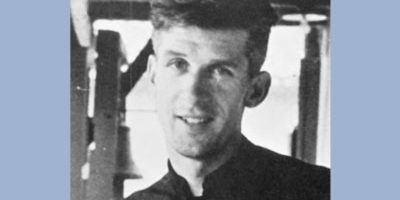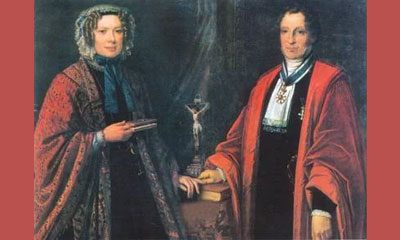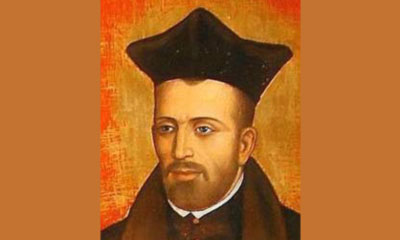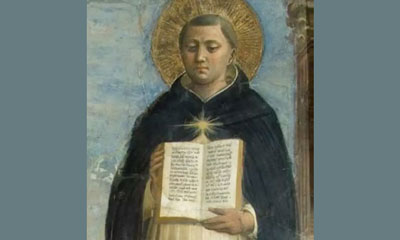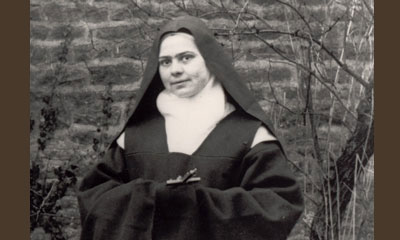February 2, 2017
Blessed Mario Borzaga
Dear Friends,
In 1894, a young Carmelite from Lisieux volunteered to join the Carmel recently founded in Saigon, in Indochina. She was asked what she planned to do in this faraway mission land. She replied, “Do you think that I would go on mission to do something? I am sure that I would do nothing at all.” Saint Therese of the Child Jesus meant by this that it is not concrete results that count in God’s eyes, but the love that we put into our undertakings. The short life of Blessed Mario Borzaga, a missionary priest, killed at the age of twenty-eight in Laos after three years of an apostolate without visible results, is a beautiful example of faith in the hidden fruitfulness of love.
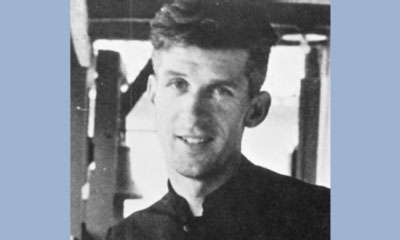 Born in 1932 in Trento, at the foot of the Italian Alps, and having entered a seminary intending to become a priest, at the age of twenty Mario Borzaga was struck by the testimony of a missionary. He entered the novitiate of the Oblates of Mary Immaculate, a missionary congregation founded in Marseilles in the nineteenth century by Saint Eugene de Mazenod. Just before making his perpetual vows in 1956, Mario wrote in his diary of the “dream of happiness” that he had for his life: “I have understood my vocation: to be a happy man, even while trying to identify myself with Christ crucified. How many sufferings remain, Lord? You alone know, and at every moment of my life I say Fiat voluntas tua—Thy will be done. I would like to be, like the Eucharist, a good bread to be eaten by my brothers, their divine food. So I must first go through death on the cross. First the sacrifice, then the joy of distributing myself to brothers around the world. … If I were to give myself without first sublimating myself through sacrifice, I would give my brothers who are hungry for God nothing but a human wreck. But if I accept my death in union with that of Jesus, it is Jesus Himself that I will be able to give to my brothers, with my own hands. So it is not a matter so much of renouncing myself as it is of strengthening all that is in me that is capable of suffering, of being immolated, of being sacrificed for the souls that Jesus has given me to love” (Father Mario Borzaga, O.M.I., The Diary of a Happy Man, November 17, 1956).
Born in 1932 in Trento, at the foot of the Italian Alps, and having entered a seminary intending to become a priest, at the age of twenty Mario Borzaga was struck by the testimony of a missionary. He entered the novitiate of the Oblates of Mary Immaculate, a missionary congregation founded in Marseilles in the nineteenth century by Saint Eugene de Mazenod. Just before making his perpetual vows in 1956, Mario wrote in his diary of the “dream of happiness” that he had for his life: “I have understood my vocation: to be a happy man, even while trying to identify myself with Christ crucified. How many sufferings remain, Lord? You alone know, and at every moment of my life I say Fiat voluntas tua—Thy will be done. I would like to be, like the Eucharist, a good bread to be eaten by my brothers, their divine food. So I must first go through death on the cross. First the sacrifice, then the joy of distributing myself to brothers around the world. … If I were to give myself without first sublimating myself through sacrifice, I would give my brothers who are hungry for God nothing but a human wreck. But if I accept my death in union with that of Jesus, it is Jesus Himself that I will be able to give to my brothers, with my own hands. So it is not a matter so much of renouncing myself as it is of strengthening all that is in me that is capable of suffering, of being immolated, of being sacrificed for the souls that Jesus has given me to love” (Father Mario Borzaga, O.M.I., The Diary of a Happy Man, November 17, 1956).
Chosen for martyrdom
Ordained a priest in 1957, Mario confided in his diary: “If Jesus has given me His love, I must give Him love. If He has given me His blood, I must give him my blood! … The Christ who has chosen me is the same who has given life and strength to the martyrs and the virgins—they were people like me, weak and fragile. I too am chosen for martyrdom.”
A group of Missionary Oblates were to be sent to Laos, and Mario volunteered for this dangerous mission. He expected to find a pagan population there to evangelize in a context of poverty and sacrifice. He knew that the country was at war and was not unaware that Father Jean-Baptiste Malo, a priest from the Society for Foreign Missions of Paris, had, while stationed in Laos, died of exhaustion in 1954 on the road that was leading him to a Vietnamese concentration camp.
In the encyclical Redemptoris Missio (December 7, 1990), Saint John Paul II mentions an objection that is often made against missions: “As a result of the changes which have taken place in modern times and the spread of new theological ideas, some people wonder: Is missionary work among non-Christians still relevant? Has it not been replaced by inter-religious dialogue? Is not human development an adequate goal of the Church’s mission? Does not respect for conscience and for freedom exclude all efforts at conversion? Is it not possible to attain salvation in any religion?” The Pope replies by quoting Saint Peter: And there is salvation in no one else, for there is no other name under heaven given among men by which we must be saved (Acts 4:12). “This statement, which was made to the Sanhedrin,” continues John Paul II, “has a universal value, since for all people—Jews and Gentiles alike—salvation can only come from Jesus Christ… Christ is the one mediator between God and mankind (cf. I Tim. 2:5) … No one, therefore, can enter into communion with God except through Christ, by the working of the Holy Spirit. Christ’s one, universal mediation, far from being an obstacle on the journey toward God, is the way established by God Himself” (RM, no. 4-5).
Mario Borzaga left for Laos in the fall of 1957. This country in Indochina is wedged between Vietnam and Thailand. It currently has a population of seven million, primarily Buddhists. A landlocked mountainous kingdom, its first Catholic missionaries only arrived in 1884. In 1893, France’s protectorate was extended to Laos, but the anticlerical French authorities gave no help to the Catholic missions. The missionaries had to establish small missionary posts very discreetly. Most Christians were foreigners, particularly Vietnamese, and few Laotians were converted; nevertheless the Gospel was enthusiastically received by some tribes of mountain people, who had until then practiced animist religions. In 1940, Japan invaded Indochina, and the French priests were driven out. After Japan’s surrender, the Pathet Lao, an offshoot of the Viet Minh (the Vietnamese Communist party), launched a guerilla war against the royal Laotian government. In 1954, France left Indochina. Now independent, Laos was ravaged by the Vietnam War, some of which unfolded on its territory.
My cross
Father Mario Borzaga soon faced great difficulties. In the mission in Kengsadok, he had to learn everything: first the Laotian language, a lengthy effort and a prerequisite for any communication with those he had come to evangelize. He also had to learn a thousand practical skills that would allow him to survive and help a destitute population—hunting, fishing, constructing wooden huts, mechanics… All this in a hot and humid climate, in the midst of a civil war. The young missionary discovered over time that it is “difficult to learn from all, in silence, difficult especially to believe, to suffer, and to love.” God did not ask him to perform the heroic acts he dreamt of, but to work in obscurity, patiently and without visible results. He also knew, like Jesus in the garden of Gethsemane, the fear of suffering and of death (cf. Mk. 14:33). On one day of interior turmoil, he noted: “My cross is myself; my cross is the language that I have not yet managed to learn; my cross is my shyness that keeps me from saying a single word in Laotian.” He then wrote this prayer: “Everything belongs to You, Lord, even sickness, anguish, remorse, obscurity… I love You because You are Love.”
At the end of 1958, the twenty-six-year-old Father Borzaga was sent to Kiu Katiam, his first missionary post, in a village of ethnic Hmong. This outpost of Christianity had been founded several decades earlier. Soon, Mario found himself alone in the midst of the indigenous people he had to care for, both spiritually and temporally. Celebrating the Mass, teaching the catechism, training catechists, preparing catechumens for Baptism, hearing confessions, taking in and caring for the sick at the mission’s free clinic, visiting neighboring villages—all these tasks filled his days without break or rest. Unfortunately, the Hmong didn’t speak Laotian, but another language the Father didn’t know. Mario nevertheless did not become discouraged, but placing all his trust in God, he set to work. Shy, he found his confidence in the certitude of being where the Lord Jesus wanted him to be. To compensate for his inability to speak, he worked selflessly, and in doing so won the hearts of the Hmong who, feeling themselves loved, nicknamed him “serious and sincere heart.” His patience was unfailing, even in moments of discouragement and sadness. Father Borzaga, who was very musical, taught his faithful religious songs and composed a beautiful Salve Regina in Hmong. Nevertheless, he had to fight a strong revulsion for Laotian food, the inhabitants’ lack of hygiene, and the debilitating climate. He wrote in his diary: “I smile in all circumstances, not because I feel sure of myself, but because I am sure that in the battle, Jesus also uses worn-out bayonets, rusty cannons, and sleepy foot soldiers. This is why I make a point of making Him know that I am a part of it, so that He might use me for something… How can I not thank God infinitely for His preferential Love for me, by which He has given me the faith, and has made me know His Church? O God, how You have been immensely good to me! What have I done to merit such love?”
A small flame in the night
In two letters from 1959, the young missionary realistically describes the situation of his mission: “The Lord’s harvest is vast where the Hmong live, on the mountains above the moors and swamps where the buffalo roam. Everything is about to begin, with the grace of God; hundreds of harvesters are needed, in our area alone. We are but a half-dozen. Pray that our holiness might burn like a small flame in the night… The missionary makes himself a wanderer for those who are hopeless wanderers in the darkness; he makes himself a hermit for the love of he who, in the frozen loneliness of paganism, seeks a hand to open for him the door of the heavenly City.”
Pope John Paul II did not hesitate to forcefully declare the legitimacy and indispensability of mission: “Proclaiming Christ and bearing witness to Him, when done in a way that respects consciences, does not violate freedom. Faith demands a free adherence on the part of man, but at the same time faith must also be offered to him, because the multitudes have the right to know the riches of the mystery of Christ—riches in which we believe that the whole of humanity can find, in unsuspected fullness, everything that it is gropingly searching for concerning God, man and his destiny, life and death, and truth… This is why the Church keeps her missionary spirit alive, and even wishes to intensify it in the moment of history in which we are living” (RM, no. 8).
Sing with the Father
Mario’s young catechist students kept a tender memory of the man who had been for them a real father. One of them wrote: “Father Mario Borzaga was very patient and had a good heart. He loved everyone. He understood a little of the Hmong language—I was the one who taught it to him.” Another catechist testified: “I lived with Father for about a year. I was only sixteen years old, and I didn’t know how to build a house. We went to talk to Father. For a six-by-eight-meter house, he calculated on a piece of paper that the sheet metal, the beams, etc. would cost nine bars of silver. I agreed. Then we went to chop down some big trees and brought them to Father to saw. There was also a Brother who came to help Father Borzaga—they sawed the wood to build my house, and we built it. Every evening, at the end of the meal, we went to learn to sing prayers with Father Borzaga. He had a beautiful strong voice.” A witness affirmed: “He was very kind, smiling, handsome, very open. He took good care of the sick and carefully watched over his catechist students who had come from other areas to study with him. We lived in a little house behind his. He bought us clothes and flashlights. He was very patient, didn’t get annoyed, and had a lot of drive. He took good care of us. The boy in charge, who was the eldest among us, was often invited to his table.”
Missionaries do not limit themselves to humanitarian actions—in helping peasants obtain food or caring for them, they seek to open their souls to the love of Jesus Christ. A Laotian would write to the parents of Father Vincent L’Hénoret, an Oblate murdered in 1961 by members of the resistance: “Your son taught us many things. He helped us to know the good Lord, he made us virtuous, he was always there to cure us. He taught us to avoid sin, he gave us the grace of God.” The missionaries fought against the custom still in practice among Christians of offering sacrificial chickens to the spirits to obtain the healing of their sick. Concerned about the young keeping their faith, they forbade them to participate in Buddhist festivals.
In 1959, the Holy See asked missionaries working in countries where war was raging to remain at their posts, even at the risk of their lives. These orders were unanimously accepted by the priests in Indochina, who knew nevertheless that they were risking martyrdom. After Mass on Sunday, April 24, 1960, Mario busied himself caring for the sick at the free clinic. A small group of Hmong arrived and asked him to come to their village, a three-day journey on foot. They wanted instruction in the Christian religion, and medical care for their sick. It was an opportunity to be seized, because being Easter vacation, two other Oblate missionaries were there who could look after the mission. Mario promised to follow them the next day. His plan was to visit several villages and so complete a missionary round before the rainy season began. He invited the catechist Paul Thoj Xyooj, nineteen years old, to accompany him, and promised to return in one or two weeks. On Monday, April 25, 1960, the feast of Saint Mark the Evangelist, they set out, bearers of the Good News of Jesus and His love for the poor and the sick. Father Borzaga was seen leaving, backpack on his back, beret on his head, dressed completely in black like a Hmong. He disappeared from sight as he and his companion wound their way along the path and plunged into the brush. The two arrived at the village that was their destination, Ban Phoua Xua, where Father Borzaga cared for the sick, and then left again, promising to return several months later. Their journey was particularly dangerous as Communist guerillas had infiltrated the area and were circulating freely.
Why did you shoot?
On May 1, a Pathet Lao patrol met Father Borzaga and his young companion in Muang Met, a village of ethnic Kmhmu. Accusing Mario of being an American, the Communist guerillas tied his arms behind his back, and spoke to him harshly. The catechist Paul exclaimed, “Don’t kill him, he’s not an American but an Italian, and he’s a very good priest, very kind to everyone. He only does good things.” Then he told the soldiers that were urging him to run away: “I’m not leaving, I’m staying with him. If you kill him, kill me, too. Where he dies, I’ll die, and where he lives, I’ll live.” The guerrillas beat the catechist savagely to silence him, and decided to kill both men without witnesses, some distance from the village. During this time, Mario remained calm and quiet, like Jesus before His accusers. Several decades after the event, the leader of the group would relate: “We forced them to dig a grave. I was the one who shot them. The Hmong was killed instantly but the American, as he fell into the grave, cried out, ‘Why did you shoot me, a Father?’ We immediately covered them with dirt, then searched the American’s backpack. There wasn’t much: some beaded cords with two pieces of crossed iron, images of a radiant woman, by herself or with a child, and pictures of a man with the heart outside…” Rosaries, images of the Sacred Heart of Jesus and the Virgin Mary, were the missionary’s treasure, his only weapons. This May 1st was a Sunday. It is likely that in this non-Christian village, Mario had celebrated Mass very early that morning, alone with his catechist—that was his Viaticum.
A student catechist testified: “In April 1960, Father went to his death, and I took care of his house and cared for his animals until July. Then they came to kill all his animals, chickens, pigs… They took all his Mass wine, took all his habits, wrecked his house. I had to abandon the house and flee into the forest. I love him and I still think constantly about him—he had a kind heart and was very patient. He loved everyone, he loved me and he is dead. I cried with flowing tears. Now I still think about him because he was like my father. I believe and I am sure that he is praying to God to help me every day. I am sure that Xyooj and he are with God; because these two had a very difficult road. Xyooj and Father are surely saints in Heaven forever.” Another of Father Borzaga’s former students declared: “I firmly attest that Father Mario was killed because he went to that village to drive out the spirits and allow the people to embrace Christianity. We are all convinced of it—he was killed because he went to proclaim the Good News of Jesus and care for the sick.” The leaders of the guerillas, trained in China and Vietnam, wished to stop the spread of Christianity in Laos. They were convinced that once the missionaries left or were killed, it would be easy to rally the people to the Marxist-Leninist ideology.
Catholic missions have at stake the eternal salvation of souls, a question of the utmost importance that faces every man and woman. “The temptation today,” wrote Saint John Paul II, “is to reduce Christianity to merely human wisdom, a pseudo-science of well-being. In our heavily secularized world a ‘gradual secularization of salvation’ has taken place, so that people strive for the good of man, but man who is truncated, reduced to his merely horizontal dimension. We know, however, that Jesus came to bring integral salvation, one which embraces the whole person and all mankind, and opens up the wondrous prospect of divine filiation. Why mission? Because to us, as to Saint Paul, this grace was given, to preach to the Gentiles the unsearchable riches of Christ” (cf. Eph. 3:8) (RM, no. 11).
To believe and love
The life of Mario Borzaga demonstrates that the missionary vocation lived out in love is a true way to holiness: “I want to have grow in me a faith and love as deep and solid as rock,” he wrote. “Without that I cannot be a martyr. Faith and love are indispensable. All that matters is to believe and love.”
On June 5, 2015, Pope Francis signed the decree of beatification of seventeen martyrs who died in Laos between 1954 and 1970. They include ten French, six Indochinese and one Italian—Mario Borzaga. The ceremony of beatification has taken place in Laos on December 11, 2016. Currently a relative softening of the Communist regime allows the 50,000 Catholics to experience tolerance, preserved at the price of great discretion. Today, most of the Catholic priests active in Laos are Laotian. They have taken up the beautiful challenge laid down by the European missionaries who came to the aid of their forsaken people. However, according to a Laotian nun, “in the north of the country, the situation is particularly difficult: all external expression of the faith is forbidden—including places of worship, crosses, images, sacred books, as well as any gesture or word that could possibly be interpreted as proselytism” (2013 testimony).
As Saint John Paul II emphasized, mission is the responsibility of all Christians: “The number of those awaiting Christ is still immense … We cannot be content when we consider the millions of our brothers and sisters, who like us have been redeemed by the blood of Christ, but who live in ignorance of the love of God. For each believer, as for the entire Church, the missionary task must remain foremost, for it concerns the eternal destiny of humanity and corresponds to God’s mysterious and merciful plan” (RM, no. 86).
“The blood of the martyrs is the seed of the Church” (Tertullian). Let us ask Jesus, through the intercession of Blessed Mario Borzaga and his companions—seeds fallen to the earth in Laos—to produce an abundant harvest for eternal life.


